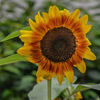Check out Underwater Photography Forum section of our forum.
When do you stop post processing?
Aug 26, 2014 16:12:47 #
gvarner
Loc: Central Oregon Coast
Post processing can go on forever with a RAW file. Save the original of a JPEG and always work from that and it can go on forever. When does PP become fiddling? A picture is worth a thousand words but it certainly doesn't need PP a thousand times. Or is it just a matter of the artist's "aha" moment? Seems like there could be two objectives: 1. Render a photo to what you remember it to look like when you took it, or 2. Create an artistic rendition of what the photo represents to you. Your thoughts on this would be greatly appreciated.
Aug 26, 2014 17:13:36 #
There are at least two (probably many more) basic ways to approach the making of a "photograph".
One is the Ansel Adams previsualization method. That is, you look for some object that will make a great photo, and when you see that photo in your mind (as opposed to seeing the subject of the photo), the work begins. Pre-capture work includes deciding when to take the picture, from exactly where to take it, and with what equipment. Then configuring the camera, lights, whatever, in such a way that the camera will capture the best data possible. After the shutter release, the data is processed to best produce the photograph previously imagined.
Every step of the way depends on all of the preceding steps to have been done with all of the following steps in mind.
Another way might be called the Garry Winogrand methodology. Look for objects in a circumstance that you haven't photographed before. Shoot them from any and every angle possible. The point is that photographing an object produces just that: a photograph. It is a new thing, only somewhat related to what was photographed. The intent is to see what the object looks like when photographed. Since we are emotionally attached to pictures we take, it doesn't hurt anything of the images shot today are not even looked at for many months. Wait until what it was and how you took it is lost from memory, and only then pick out which images are good photographs. Process them in whatever way makes them the best they can be.
This method depends on an inquisitive mind, and the ability to rush home and not look at what you shot today, but instead dig out and edit pictures taken months ago that you've forgotten all about.
Combining both methods isn't difficult, and means there is never any lack for something to do with your time.
One is the Ansel Adams previsualization method. That is, you look for some object that will make a great photo, and when you see that photo in your mind (as opposed to seeing the subject of the photo), the work begins. Pre-capture work includes deciding when to take the picture, from exactly where to take it, and with what equipment. Then configuring the camera, lights, whatever, in such a way that the camera will capture the best data possible. After the shutter release, the data is processed to best produce the photograph previously imagined.
Every step of the way depends on all of the preceding steps to have been done with all of the following steps in mind.
Another way might be called the Garry Winogrand methodology. Look for objects in a circumstance that you haven't photographed before. Shoot them from any and every angle possible. The point is that photographing an object produces just that: a photograph. It is a new thing, only somewhat related to what was photographed. The intent is to see what the object looks like when photographed. Since we are emotionally attached to pictures we take, it doesn't hurt anything of the images shot today are not even looked at for many months. Wait until what it was and how you took it is lost from memory, and only then pick out which images are good photographs. Process them in whatever way makes them the best they can be.
This method depends on an inquisitive mind, and the ability to rush home and not look at what you shot today, but instead dig out and edit pictures taken months ago that you've forgotten all about.
Combining both methods isn't difficult, and means there is never any lack for something to do with your time.
Aug 26, 2014 18:04:53 #
gvarner wrote:
Post processing can go on forever with a RAW file.... (show quote)
Unfortunately with the way our memories work although you can do 1 as stated it is unlikely that your memory accurately reflects what you really saw at the time. Memory is not like a photograph. Memories change each time they are recalled.
So the bottom line is you keep at it till your face looks like this:
:lol:
Check out Smartphone Photography section of our forum.
Aug 26, 2014 18:22:27 #
wow, a loaded question.
For me, it depends on what the image is for.
Is it for a client? Is it for wall art? Is for my wallpaper?
Is it to have a chance to play with my camera and computer to see what I get?
I have photos from years ago that I still go back to play with in PS. I know far more about PS than I did in 1999 when I started with it.
Some clients work I can get into a real artsy tizzy, till my wife reminds me, they aren't paying for that. Wait to play until after you deliver :-)
GT
For me, it depends on what the image is for.
Is it for a client? Is it for wall art? Is for my wallpaper?
Is it to have a chance to play with my camera and computer to see what I get?
I have photos from years ago that I still go back to play with in PS. I know far more about PS than I did in 1999 when I started with it.
Some clients work I can get into a real artsy tizzy, till my wife reminds me, they aren't paying for that. Wait to play until after you deliver :-)
GT
Aug 26, 2014 18:29:46 #
Being relatively new to the joys of pp, I often lean towards #2. But that doesn't mean all my photos look "unreal," just that I may spend time tweaking lights and darks, or other aspects (e.g. cloning) because I'm enjoying the process of creating ("crafting" ) my vision...or, yes, I may go a little crazy with Topaz Simplify or Nik Color Efex filters.
I don't think pp should be thought of as work, so as soon as the process becomes tedious, personally I would move on. As long as you're enjoying the process, no need to stop :)
I don't think pp should be thought of as work, so as soon as the process becomes tedious, personally I would move on. As long as you're enjoying the process, no need to stop :)
Aug 26, 2014 23:12:25 #
Looking back at my collection of images made me realize that I am never finished. Nothing is ever final - even after I have printed. I merely achieve a hiatus - a temporary place for reconsiderations. At times I look at a final image and start all over again. Post processing is just that - a process.
Why would you bother to save a raw file if there were no intention to go back and have another look?
Why would you bother to save a raw file if there were no intention to go back and have another look?
Aug 27, 2014 07:49:42 #
Simple for me. I stop when I get the result I want to achieve. If at a later date I think of something else I want to do with the photo I can easily create another version.
Check out The Dynamics of Photographic Lighting section of our forum.
Aug 27, 2014 08:30:00 #
Aug 27, 2014 08:30:05 #
gvarner wrote:
Post processing can go on forever with a RAW file.... (show quote)
Wonderful question. Thanks for asking. Here is my experience based upon more than 45 years in photography. Your point about objectives is key. For me, the answer is simple: 1 but with a little modification. Since I prefer the natural look in photos, I want my photos to look like the original scene but will go further to bring out details I want and to reduce ones I do not want.
For example, I like big, dramatic skies but skies are often overexposed. Therefore, I bring out the blue because I like that color. This also may reveal lost clouds adding interest to the sky. How about those power cables on the horizon? Clone them out in a heartbeat. And I straighten my horizons and may also fix perspective problems.
I always adjust the raw, never the jpg. LR and PS but not PSE are 16-bit editors meaning that many adjustments have much wider latitude. Since the processing is non-destructive, you never lose the original raw. Just like printing negatives. The negative is the raw. The print is the jpg. The print or jpg can vary as you wish while the negative or raw never changes.
When do you stop fiddling? This depends upon how good your shots are, your own photographic style or personality and your skill level. As a novice, I could spend an hour fiddling and still have something I was not completely pleased with. Today, I finish 95% of my edits within three minutes in LR. For the rest, PS.
I hope this gives you some food for thought.
If you want to reply, then register here. Registration is free and your account is created instantly, so you can post right away.
Check out Panorama section of our forum.






